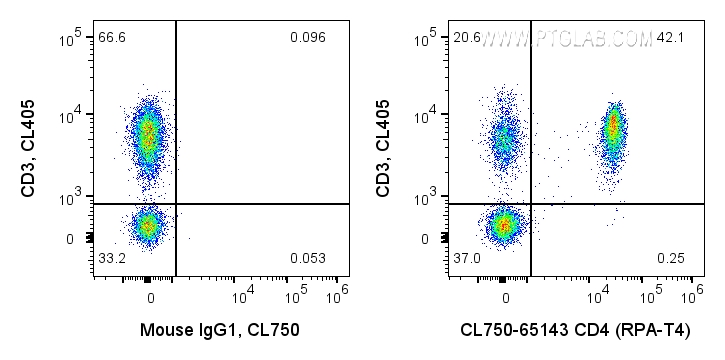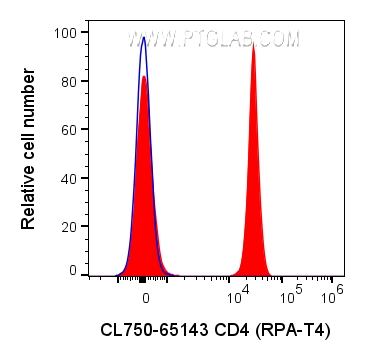验证数据展示
经过测试的应用
| Positive FC detected in | human PBMCs |
推荐稀释比
| 应用 | 推荐稀释比 |
|---|---|
| Flow Cytometry (FC) | FC : 5 ul per 10^6 cells in 100 μl suspension |
| This reagent has been pre-titrated and tested for flow cytometric analysis. The suggested use of this reagent is 5 ul per 10^6 cells in a 100 µl suspension or 5 ul per 100 µl of whole blood. | |
| Sample-dependent, Check data in validation data gallery. | |
产品信息
CL750-65143 targets CD4 in FC applications and shows reactivity with Human samples.
| 经测试应用 | FC Application Description |
| 经测试反应性 | Human |
| 免疫原 |
N/A 种属同源性预测 |
| 宿主/亚型 | Mouse / IgG1, kappa |
| 抗体类别 | Monoclonal |
| 产品类型 | Antibody |
| 全称 | CD4 molecule |
| 别名 | CD4, CD4 molecule, CD4mut |
| 计算分子量 | 55 kDa |
| GenBank蛋白编号 | BC025782 |
| 基因名称 | CD4 |
| Gene ID (NCBI) | 920 |
| ENSEMBL Gene ID | ENSG00000010610 |
| RRID | AB_3084858 |
| 偶联类型 | CoraLite® Plus 750 Fluorescent Dye |
| 最大激发/发射波长 | 755 nm / 780 nm |
| 形式 | Liquid |
| 纯化方式 | Affinity purification |
| UNIPROT ID | P01730 |
| 储存缓冲液 | PBS with 0.09% sodium azide and 0.5% BSA, pH 7.3. |
| 储存条件 | Store at 2-8°C. Avoid exposure to light. Stable for one year after shipment. |
背景介绍
CD4 is a 55-kDa transmembrane glycoprotein expressed on T helper cells, majority of thymocytes, monocytes, macrophages, and dendritic cells (PMID: 9304802; 12213222). CD4 is an accessory protein for MHC class-II antigen/T-cell receptor interaction. It plays an important role in T helper cell development and activation (PMID: 9539765; 3112582). CD4 serves as a receptor for the human immunodeficiency virus (HIV) (PMID: 9304802).
实验方案
| Product Specific Protocols | |
|---|---|
| FC protocol for CL Plus 750 CD4 antibody CL750-65143 | Download protocol |
| Standard Protocols | |
|---|---|
| Click here to view our Standard Protocols |



